
ODINSWORD
Classification: Magic
item;
presumably active in some form from the post-Hyborian
era to the modern era, notably in the
first millennium AD, the end of which the Rhinegold was
transformed into the Oversword
Creator: Asgardian Dwarves
forged the Aesir
Thor's
hammer, Mjolnir;
Magni
and Modi
hurled Mjolnir to Earth, the travel between realms transforming it into
the Rhinegold;
Mime
forged the Rhinegold into the Circlet
of Power/Ring of Power/Ring of the Nibelung/Rhinegold Ring;
Odin transformed the Ring of the Nibelung into the Oversword/Odinsword
User/Possessors: Alberich,
Brunnhilde
the Valkyrie, Fafnir
the Jotun, Odin Borson, Mime, Rhinemaidens
(Flosshilda, Vellgunda, and Voglinda),
Siegfried
(a mortal incarnation of Thor Odinson), Thor Odinson;
Mangog
sat atop the Odinsword and once partially withdrew it, but ultimately
was vanquished before doing so
Location: The greatest chamber of the Palace Royal,
Asgard
Aliases: Odin-Sword, Odin Sword, Oversword of
Asgard, Ragnarok (apparently its true
name);
formerly Circlet of Power, Mjolnir, Rhinegold,
Rhinegold Ring, Ring of the Nibelung, Ring of Power
First Appearance: (Rhinegold historical/Ring of the Nibelung) Nibelungenlied (circa 1200 AD; see comments);
(Wagner's
Rhinegold/Ring of the Nibelung) Das Rhinegold (The Rhinegold), the
first of four parts in the opera "Der Ring des Nibelung" (The Ring of
the Nibelung) opera (September 22, 1869);
(Oversword)
Journey into Mystery I#117/2 (June, 1965);
(Aesir Thor's Mjolnir) Thor I#293 (March, 1980);
(Marvel's Rhinegold)
Thor I#294 (April, 1980);
(Marvel's Ring of the
Nibelung) Thor I#295 (May, 1980)

Powers/Abilities/Functions: The
Aesir Thor's hammer Mjolnir was presumably composed of Uru, a virtually
indestructible ore native to Nidavellir, the realm of the Dwarves, of
the Nine (now Ten) Realms in the Asgardian cosmology.
Mjolnir allowed Thor to control the weather, and it
could be used to strike with great force.
None but Thor could lift it; however, after Thor's
death, his son's Magni and Modi were able to lift it together.
Traveling from the dying realm of Asgard
to Earth magically transformed Mjolnir into the magical Rhinegold.
The Rhinegold was a shining mass of gold, much larger
than the Circlet of Power and certainly the human-finger-sized Ring of the
Nibelung.
The Circlet of Power / Ring of Power / Ring of the
Nibelung granted vast but unspecified power to its possessor.
Fafnir used it to
transport/teleport himself and to transform into a powerful dragon.
The Circlet was perhaps 8" in diameter, with four
smaller rings through which one could fit one's four fingers. It could
change sizes to perfectly fit as a ring for a single finger on a giant or
a man.
Cursed by Alberich, the Ring was lusted after by all
gods and men, but none would rejoice in possessing it, instead eventually
meeting a grim fate.
The Odinsword/Oversword was close to 10 meters long
and described (hyperbole, almost certainly) as the most awesome
weapon in the universe.
Asgard would be safe from the Ring's
cosmic curse so long as the sword remained within its sheath, and only
one as powerful as Odin--who could purge himself through the rite of
self-sacrifice--could wield the Oversword without rending the fabric of
infinity. Odin further made sure that every Asgardian knew of the
Oversword's power and that whoever withdrew it from its scabbard would
bring the Nibelung curse upon himself, causing the heavens to tremble
around him.
The curse of the Nibelung caused the
Odinsword to forcibly unsheathe itself if Ragnarok, the twilight of the
gods, was close at hand.
Only Odin could re-sheath the Odinsword
if it were partially unsheathed.
Arishem's melting of the Odinsword
purged it of Alberich's curse.
Reformed or replaced, it was a large sword
(perhaps 5-6' long), fit for human proportions. It was highly durable and
could be used to defeat a being as powerful as Cul the Serpent at the
height of its power.

History:
(Thor I#293 (fb) - BTS) - In the previous age of Asgard,
the Dwarves forged the hammer Mjolnir for the earlier Odin's
son, Thor of the Aesir.
(Thor I#293 (fb)) - Observing Balder's
death alongside Odin, Thor carried his hammer as he joined the forces of
Asgard in opposing the Loki-led
forces opposing Asgard.
The Midgard
Serpent rose up and then lunged at Thor, sinking its fangs deep into
his flesh.
Thor forced the Serpent's jaws open and then struck it
dead with a lightning-augmented strike of his hammer, Mjolnir.

However, Thor soon after fell dead from the Serpent's
venom.
(Thor I#294 (fb)) - After Asgard's
destruction, Mjolnir was found in the Plains of Ida by Thor's sons,
Magni and Modi.
They found that while no one but Thor could lift it
previously, the two of them could now lift it together.
Modi considered that they might use the hammer's power
to lord it over their fellow surviving Aesir, but Magni convinced him
against this idea, and they instead cast the hammer to Earth.
The hammer landed in a river (which would become
known as the Rhine) in the land that would become Europe's Rhine
Valley--it struck with such impact that it altered the river's course for
all time.
Additionally, the hammer changed in passing from the
ruins of old Asgard to Midgard, turning into blinding gold.
As a great glowing rock, it rested on an unreachable
peak amid the flowing waters, and it would become known as the Rhinegold.
(Thor I#294 (fb) - BTS) - The Rhinegold came to be
guarded by a trio of mermaids known as the Rhinemaidens: Flosshilda,
Vellgunda, and Voglinda.
It was said that world-conquest would be the prize of
one who forged a ring of the Rhinegold, but only one who renounced love in
all its myriad forms would ever find magic enough to forge such a ring.

Odin proclaimed that
none should steal the Rhinegold, and he apparently warned the
Rhinemaidens of the types that might try to steal it.
(Thor: Asgard's Avenger: Oversword profile) - The Rhinemaidens guarded
the Rhinegold for many centuries.
(Thor I#294 (fb)) - Alberich of the Nibelung approached
the river Rhine as the Rhinemaidens lounged near the Rhinegold.
Flosshilda feared that he might be the
foe seeking to steal the Rhinegold of which Odin had warned them, but
Alberich claimed he merely wished to know what was gleaming.

Flosshilda then teased Alberich, telling
him the Rhinegold was not for any mortal.
When Alberich asked its secret, Vellgunda told him of
its prophecies of power, but that no one would want it, as it
required renouncing all forms of love.
Never having known love, Alberich leapt atop
the shallow peak and stole the Rhinegold, despite the pleadings of the
Rhinemaidens, who were unable to leave the water.
(Thor I#295 (fb) - BTS) - Alberich forced his brother Mime to forge the
Rhinegold into the Circlet of Power and create the helmet Tarnhelm.
Alberich used the Circlet of Power to enslave the other gnomes of the
Nibelung in the caverns beneath Nibelheim.
(Thor: Asgard's Avenger: Oversword profile) - With the ring, Alberich
was blessed with good fortune, enabling him to mine vast riches of gold
from the ground.
(Thor I#295 (fb) - BTS) - Seeking the Rhinegold to trade to the giant
brothers Fafnir and Fasolt
for the recovery of the goddess Idunn,
the gods Thor, Odin, and Loki broke into the caverns of Nibelheim.
(Thor I#295 (fb)) - As Mime pleaded with Alberich not to enslave him and
their brother-gnomes, Alberich noted that power had no kith or kin, and
that soon the men of Midgard would break their backs laboring for him as
well.
Ultimately the trio of gods tricked Alberich into
using the Tarnhelm to transform into a toad, which Odin threatened to
crush with his foot.

The gods then forced Alberich to surrender the Circlet
of Power, Tarnhelm, and gold horde.
As he surrendered the Ring, Alberich uttered the Nibelung
curse: "No man or god shall rejoice in possessing this ring --though all
in Heaven or Earth shall lust for it"; the curse would stand until the
Ring was back in his (Alberich's) hand. Decrying Alberich as a robber of
mermaids, Odin pulled the ring from Alberich's hand.
Odin then cast Alberich
away, and as he flew through the air, Alberich warned Odin that he would
one day remember his words and curse himself for his impudent folly.

(Thor I#296
(fb)) - Odin delivered the golden horde and the
Tarnhelm to Fafnir and Fasolt, but Fafnir
demanded the Ring as well. When Odin refused, Thor appreciated that Odin
was acting like a man possessed. The Earth goddess and prophetess Erda
then appeared, insisting Odin surrender the Ring, as only despair and
destruction would mark its owner's end, and that if he did not surrender
the Ring, "a mournful day would dawn for Valhalla, long before its
time." After Erda departed, Odin was still tempted by the Ring, but then
realized that might be all the more reason to get rid of it, and so he
surrendered it to the giants, who then released Idunn back to the gods.
Fafnir put the ring on his finger,
noting that whether by magic or design, the larger circle on the ring
fit his hand perfectly. Fafnir told Fasolt they would split the rest
of the gold, though he (Fafnir) would take both the larger portion and
the Tarnhelm himself as well; Fasolt refused to accept this, and in
the ensuing battle, Fafnir fatally stabbed Fasolt.
Prior to using the Ring's power to
transport himself away, Fafnir warned the gods that one day he would
know the full secret of Mime's golden ring, and on that day they would
learn that even immortals may perish -- at Ragnarok.
(Thor I#297
(fb) - BTS) - Via the Ring of Power, Fafnir
transformed himself into a dragon.
(Thor I#297 (fb) - BTS / Thor I#298 (fb) - BTS) - Siegfried--at the guidance
of his foster father Mime--confronted, battled, and mortally wounded
Fafnir.
(Thor I#298
(fb)) - Reverting to
his humanoid giant form, Fafnir told Siegfried of
the Rhinegold and his golden hoard, which was now Siegfried's, though
treason followed he who held it..."and the one who plotted for you this
terrible deed...shapes you for death..."(hinting of Mime's intent to
kill Siegfried to gain the Ring).
Having heard Fafnir mention a ring,
Siegfried pulled the glowing Circlet of Power from Fafnir's giant
finger, and the ring then shrunk to a size to fit his hand, allowing
Siegfried to don it upon his finger. Its shrinking made Siegfried
certain that the ring -- whose power he sensed was even greater than his
sword, Needful's -- was made for him, and he swiftly resolved that none
should ever wrest it away.
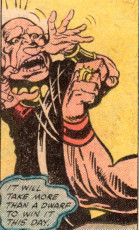
(Thor I#298
(fb)) - When Mime offered Siegfried
poisoned wine, Siegfried recognized the treachery and slew Mime.
Later, Siegfried rescued the maiden
Brunnhilde from her endless sleep, and the two fell in love.
(Thor I#299
(fb)) - Before departing to
fulfill his destiny of saving the world, Siegfried gave Brunnhilde the
Ring of the Nibelung to wear as a symbol of their undying love.
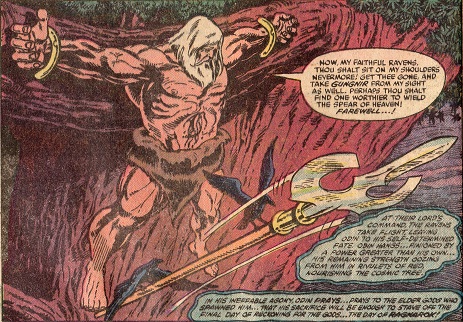
The dwarf Hagen
(Alberich's son) duped Siegfried into drinking a potion that put him
under the control of Gutruna,
the younger sister of Gibichung clan lord
Gunther.
No longer remembering Brunnhilde,
Siegfried (using the Tarnhelm to appear in the form of Gunther)
reclaimed the Ring of the Nibelung by force. Noting
that only he who had placed the ring upon her finger could remove it,
Brunnhilde asked what type of demon he was, but "Gunther"explained
that he was merely a man of might. After she swooned, Siegfried brought Brunnhilde to Gunther to be his wife and returned to
his own form; meanwhile, Hagen plotted to have
Gunther slay Siegfried, so Hagen could claim the Ring of the Nibelung.
During the planned dual wedding of
Brunnhilde to Gunther and Siegfried to Gutruna, Brunnhilde regained her
wits and revealed her past relationship with Siegfried. Misunderstanding
the timing of this, Gunther believed Siegfried had betrayed him and
ultimately ordered him to leave his kingdom. During this same time,
Brunnhilde -- distraught by Siegfried's apparent betrayal -- unwittingly
admitted that Siegfried was charmed, impervious to all harm provided he
never turned his back on his foe.
(Thor I#300
(fb)) - The next day, while Gunther tried to make
amends with Siegfried, Hagen rushed forward and shoved his spear through
Siegfried's back, killing him.
After returning to the castle, Gunther
denounced and was killed by Hagen. When Gutruna ordered the guards to
seize Hagen, he attempted to claim the Rhinegold
ring, bragging that he would soon have all others in his power, but
Siegfried's lifeless fist suddenly clenched the ring defiantly,
preventing Hagen from getting it.
After Brunnhilde and her steed leapt atop
Siegfried's funeral pyre, Odin restored them to their true godly forms
as Thor and Brunnhilde the Valkyrie before dismissing them and erasing
their memory of those events.

Odin then claimed the Ring of Power, which
had reverted to its true form, accepting its curse for himself.
Mustering his dwindling strength, he snapped the Rhinegold circlet in
half, stripped off his royal garb, and approached Yggdrasil, the world
ash. Impaling himself on his sacred spear, Gungnir, Odin then had his
ravens, Hugin and Munin, fly him up against the tree and use each of
the halves of the Ring of Power to pin his wrists against the tree.
As he hung there for days, Odin prayed
that his sacrifice might stave off Ragnarok. On the ninth day, the Earth
goddess Gaea
approached Odin, showing him a vision of a giant vessel approaching
Earth and telling him he would have to free himself to learn the
spacecraft's significance.
Filled with vitality and a new sense of
purpose, Odin summoned every vestige of his almost-depleted might and
wrenched himself free of the Rhinegold restraints. After gathering his
strength, Odin rose, tucked the ring fragments into "his breach" (his
wound?), and staggered back to Asgard.
Learning from Mimir
of the Space Gods (Celestials) who were coming to judge Earth, Odin
arranged a meeting of the Godheads
of Earth's various pantheons.
Ultimately forced by the Celestials'
vast power to swear not to interfere with their mission for the next
millennium, the Godheads prepared for a future conflict with the
Celestials. Odin had his greatest craftsmen forge the Destroyer armor.
Odin then used his mystic power
scepter, fashioned by his chief wizard for the purpose of channeling his
might, to send a magical ray into the Rhinegold ring halves that
unleashed the Ring's very essence. Even Odin was forced to step back and
shut his eyes against the brilliant glare as the shimmering Rhinegold
assumed new form and dimensions according to his will.
As Odin opened his eyes, the change was
complete, and the Rhinegold had been transformed into a huge,
magnificent sword, which Odin decreed would be known as the Oversword of
Asgard.

Asgard would be safe from the Ring's
cosmic curse so long as the sword remained within its sheath, and only
one as powerful as Odin, who could purge himself through the rite of
self-sacrifice, could wield the Oversword without rending the fabric
of infinity.
Odin further made sure that every
Asgardian knew of the Oversword's power, and that whoever withdrew it
from its scabbard would bring the Nibelung curse upon himself, causing
the Heavens to tremble around him.
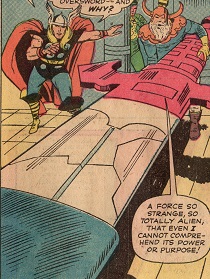
Odin hoped, in a millennium, to
bequeath the curse to the Celestials.
(Journey into Mystery I#117/2 (fb) - BTS) -
Legend foretold that if the Oversword ever left its sheath, the end of
the universe would be at hand.
(Journey into Mystery I#117/2 (fb) - BTS) - Odin
discovered a crack in the Oversword.
(Journey into Mystery I#117/2) - Odin showed the cracks in
the Oversword to Thor and Loki, and they all appreciated that the larger
the cracks became, the closer they came to annihilation.
(Journey into Mystery I#117/2 - BTS) - Odin dispatched
Thor and Loki on a quest through Asgard's Nine Worlds in search of the
hidden foe that was the cause of the cracks in the blade.
(Thor I#126/2 - BTS / Thor
I#127/2 - BTS) - Odin summoned Thor and Loki back
to Asgard, where he consulted with the prophetess Volla
and learned of Ragnarok's threat.
(Thor I#128/2 - BTS / Thor I#129/2
- BTS) - Blaming Loki for Ragnarok, Odin put Loki
in the Well of Eternal Sleep.
(Thor I#128) - After the sorcerer Seidring had betrayed Odin and usurped
his power, Thor rushed to the Odin-Sword to gain the power to challenge
Seidring.
However, before Thor could touch its hilt, Siedring
blasted him away, although Seidring had to limit his blast to avoid
affecting the Odin-Sword (noting that if the Odin-Sword fell, the
cosmos itself would vanish).
Merely stunned, Thor rose to his feet and grabbed the
sword's hilt, then ordered Seidring to return the Odinpower or he would
draw the sword. After briefly hesitating, Seidring fearfully yielded and
returned the Odinpower to Odin.
(Thor I#144 - BTS) - Forsung
of the Enchanters challenged Odin to combat for supremacy of Asgard, with
the Odin-Sword (within the nearby vault, the exterior of which was
pictured) as the prize.
(Thor I#145 (fb) - BTS) - Odin slew Forsung during their challenge.

|
(Thor I#156) - As the Mangog made its way to Asgard,
seeking to draw the Odinsword, Rigellian Recorder#211 arrived in Asgard
city and--with Odin undergoing the Odinsleep--warned Sif of Mangog's
intent.
In order monitor the coming events, the Recorder
accompanied Sif to the Odinsword, which she pledged to defend with her
life.
(Thor I#157) - Despite the combined efforts of the Asgardians, the Mangog
made its way to the Odinsword's chamber. Fighting past Thor and Sif, the
Mangog began to withdraw the Odinsword.
Thor desperately summoned a powerful storm that
awakened Odin from the Odinsleep.
Odin then broke the spell that created Mangog,
restoring its "billion billion beings" to existence, and Mangog faded from
existence.
Odin then replaced the partially unsheathed Odinsword.
|
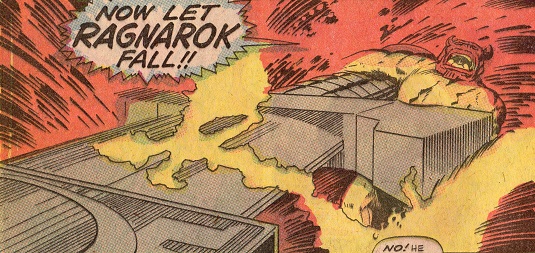
|
|
(Thor I#184 (fb) - BTS) - Over an undetermined period of
time, Odin found the Odinsword seemingly straining to unsheathe itself;
each day, he would sheath it anew, only to find it beginning to
unsheathe again the next day.
Additionally, Odin was haunted by the word "infinity,"
the significance of which he was unable to determine.
(Thor I#184) - Odin summoned Thor to Earth, noting how the planets at the
outermost end of the universe were progressively vanishing, then showed
him how the Odinsword was straining to unsheathe itself and telling him of
the word "infinity."
(Thor I#184 - BTS) - Odin departed to seek out Infinity, later sending an
image of himself to Thor, warning him of the threat from the world beyond
and of "infinity."
(Thor I#185) - The Vizier showed Sif how the Odinsword slowly but
progressively was backing out of its sheath.
(Thor I#186) - The Vizier told Sif how the world would end when the
Odinsword was unsheathed, and that each time he looked, it had backed out
more.
The Warriors Three -- Fandral, Hogun, and Volstagg --
who had returned from the World Beyond entranced, broke into the
Odinsword's chamber, instructing Sif to stand aside, as the Odinsword must
leave its scabbard.
(Thor: Asgard's Avenger: Oversword profile) - Sif organized an effort to
force it back, employing a massive vice and dozens of gods.
(Thor I#187) - The vice was used in a futile attempt to force the
Odinsword back into its sheath; Odin's vizier noted that only Odin could
sheath the mystic blade.
Later, Sif showed Loki a vision of the unsheathing
Odinsword, convincing Loki to aid Asgard's efforts for his own benefit.
(Thor I#188) - As giants and trolls assaulted Asgard's gods, the
Odinsword continued to slip ever further from its scabbard.
After Odin drove off Infinity's influence and returned
to Asgard, he restored the nearly completely unsheathed Odinsword.
|

|
(Thor I#198) - Mangog broke into the Odinsword's chamber
and withdrew the Odinsword. As the building was torn apart by the
unleashed forces, Odin confronted the Mangog, who charged him with the
Odinsword. Odin, however, drained his remaining power to both sever
Mangog from his master's hate (the source of his power) and
sending the Odinsword back into its sheath.
(Thor I#198 - BTS) - Mangog dwindled and shrunk from existence.
(Thor I#250 (fb)) - Igron used power usurped from each Asgardian god to
restore Mangog's power.
(Thor I#249) - A restored Mangog, having usurped the position and form of
Odin, had a number of warriors carry the Odinsword from its chambers (from which it had never been moved before)
to the throne room. This decision caused a number of Odin's most loyal
supporters to question his sanity.
Dismissing this, "Odin" noted that none would dare
oppose him or risk the Odinsword being unsheathed. He then had the golden
throne brought down and set atop the Odinsword.
When Thor entered the throne room and and questioned
the sitting of "Odin" atop the Odinsword and his choosing the treacherous
Igron as his aide, "Odin" transformed into his true form of Mangog.
(Thor I#250) - Mangog warned Thor that if anyone tried to usurp his
golden throne, he would pull the Odinsword from its scabbard, and bring
the universe to a swift and fiery end.
After Mangog's true identity was eventually exposed,
Mangog returned to the Odinsword to withdraw it. However, as Thor opposed
him, Mangog used up the energy that sustained him, and he faded from
existence.
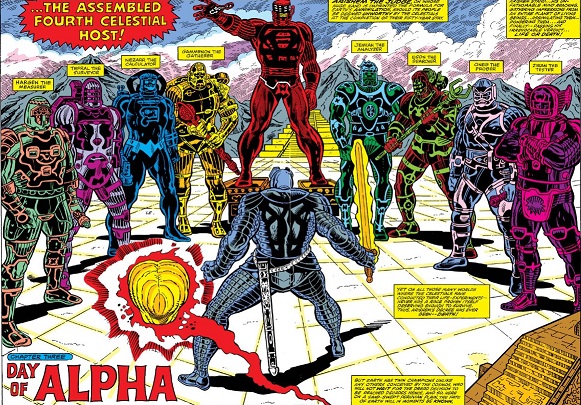
|
(Thor I#293-300) - The Eye
of Odin related to Thor the history of the Aesir,
the Rhinegold, the Ring/Circlet of Power, and the creation of the
Oversword.
(Thor I#300 (fb) - BTS) - In preparation to confront the
Celestials, Odin gathered the spirits/life-forces of the Asgardians (not including Thor, who was in the
extradimensional realm
of the Eye of Odin), animated the Destroyer armor (which grew to 2000' tall), and
withdrew the Odinsword.
(Thor I#300) - Wielding the Odinsword, the
Asgardians-powered and Odin-controlled Destroyer confronted the
Celestials at the City of the Space Gods in the Andes Mountains,
alongside the Uni-Mind (containing the collective power and forms of
Earth's Eternals).
The Destroyer used the Odinsword to cut
off Nezarr's arm, but the Celestial restored the severed limb.
Ultimately, however, the Celestials
dispersed the Uni-Mind, and -- after Tefral the Surveyor blasted the
Oversword from its hand -- melted the Destroyer into molten slag.
Believing his father and possibly all
of the Asgardian gods to have perished, Thor attacked the Celestials,
eventually hurling the Oversword to impale the mighty Arishem the Judge.
Apparently having allowed the sword to
penetrate his form to better analyze its alien structure and mystic
properties, Arishem withdrew the Oversword from himself then melted it,
somehow purging the Nibelung's heinous curse in the process.
Gaea then
interrupted the conflict, revealing the Young
Gods she had gathered as representatives of the best of mankind,
which caused the Celestials to judge in humanity's favor.
|

|

(Fear Itself#6) - As
Thor prepared to face Cul the Serpent, Odin presented Thor with the
Odinsword (now in the proportions of a human's sword [or maybe a
littler bigger]), noting that its true name was Ragnarok and
that it was capable of killing Cul. He further noted it as "A
blade forged to end all things. A warning and a promise, this, as
big as anything."
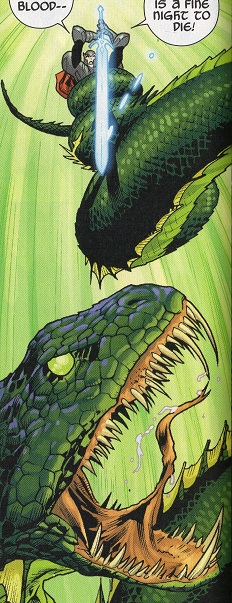
(Fear Itself#7 - BTS) - Thor returned to
Earth alongside Iron Man, who delivered Odin-blessed weapons to
Earth's heroes.
(Journey into Mystery
I#628) - Wielding the Odinsword and Mjolnir,
Thor flew to confront Cul.
(Fear Itself#7) - Wielding the Odinsword and Mjolnir, Thor
confronted Cul (in the form of giant winged serpent)
(Avengers Academy#20) - Wielding the Odinsword
and Mjolnir, Thor weathered Cul's fiery breath.
(Fear Itself#7) - As the Cul-serpent coiled around him,
Thor slashed the coils with the Odinsword and then hurled Mjolnir to
Earth; Captain America wielded the hammer to lead Earth's forces against
Cul's "Worthy"
and his other armies.
Thor repeatedly slashed the Cul-serpent
with the sword, stabbing through its tongue and holding open its mouth
to prevent himself from being swallowed.
(Journey into Mystery I#629) - Standing atop Cul, Thor raised the Odinsword.
(Fear Itself#7) - Thor stabbed the
sword in Cul's head, defeating him.
(Fear Itself#7 - BTS) - After Cul
fell to Earth, Thor made his way to Odin before collapsing, seemingly
dead.
Odin took Cul to Asgard to watch over
him, and sealed the realm off from the other Asgardians.
Comments: The Rhinegold and
the Ring of the Nibelung were created by
unidentified Norse persons in the Nibelungenlied (more
on that below);
adapted by Richard Wagner in his Ring of the Nibelung
trilogy (more on
that below);
adapted to Marvel from Wagner's version by Roy Thomas, Keith Pollard, and Chic Stone.
The Oversword/Odinsword was created by Stan
Lee, Jack
Kirby, and Vince Colletta.
For your listening pleasure: Open this
music in a
separate window and play it while you read this profile.
If the link doesn't work, Google "Ride of the Valkyrie" and play that.
The Rhinegold was based on the
Rhinegold from Richard Wagner's Das Rheingold (The Rhinegold),
the first of four parts in the opera "Der Ring Des Nibelung" (The Ring
of the Nibelung) opera. You can Google it for more information. Or just
play Bugs Bunny's "Kill the Rabbit" version of Wagner's "Flight of the
Valkyrie."
There are no good straight-on images of
the Destroyer wielding the Odinsword. The only one is from a weird
perspective of looking down on the Destroyer and it cuts off the top of
the sword. I used the Celestials image because it is so impressive, and
because you can also see the scabbard so well.
Here's an image where you can
see the giant Destroyer with most of the sword, but the pointed tip is
slightly cut off by the panel's border.--Ron Fredricks
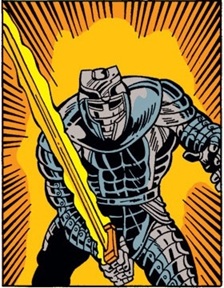
Oversword or
Odinsword...or Odin-Sword?
In its first appearance the sword is
called the "Oversword of Asgard," and a footnote notes, "sometimes
referred to as Odinsword." It's most commonly Odin-Sword in the 100s
issues, but "Odinsword" with no hyphen in #198, 249. It is again
referred to both as the "Oversword of Asgard" and the Odinsword in Thor
I#300
I did NOT see the Odinsword in Thor
I#186, but that's because my copy is missing pages 11-14. Thanks to
Daron Jensen for supplying me with scans of the relevant pages.
Fate of the
Odinsword?
Circa
Thor I#300 (1980), the Celestials melted down the Odinsword (purging it
of the Rhinegold curse in the process) and the Destroyer. The Destroyer
was later returned to existence around Thor I#381 or so, but the
Odinsword never came back…until Fear Itself#6-7 (and associated issues,
circa 2011), when Odin gives a now normal-sized sword to Thor to use
against Cul, the Serpent. Thor seems to perish defeating Cul.
Thor gets brought back to life in Mighty Thor I#8-12 (2012): Trapped on
a God Ark, Thor drifted toward the god-eating Demogorge,
but was invigorated when Mjolnir returned and enabled him to escape the
afterlife.
But,
we don’t see the Odinsword again. Was it referenced as destroyed, or
what happened to it? How was it reformed in the first place?
We do
subsequently see Odin using swords in battle, but nothing demonstrates
any power that would indicate them/it to be the Odinsword/Oversword, as
opposed to just Odin's sword.
Wagner
created the story of the Ring by fusing elements from
many German and Scandinavian myths and folk tales. The Old
Norse Edda supplied much of the
material for Das
Rheingold,
while Die
Walküre was largely based on the Völsunga
saga. Siegfried contains elements from the
Eddur, the Völsunga
saga and Thidrekssaga.
The final Götterdämmerung,
draws from the 12th-century German poem, the Nibelungenlied,
which appears to have been the original inspiration for the Ring.
Der Ring des Nibelungen (The
Ring of the Nibelung), WWV 86, is a cycle of four German-language epic music
dramas composed by Richard
Wagner. The works are based loosely on characters from the Norse
sagas and the Nibelungenlied.
The composer termed the cycle a "Bühnenfestspiel" (stage festival play),
structured in three days preceded by a Vorabend ("preliminary evening"). It
is often referred to as the Ring
Cycle, Wagner's
Ring, or simply The
Ring.
Wagner
wrote the libretto and music over the course of
about twenty-six years, from 1848 to 1874. The four parts that constitute
the Ring cycle
are, in sequence:
I'm not sure why Alberich couldn't access the Ring's
power even in toad form...perhaps once Odin got the better of him, he
magically prevented Alberich from using it against them? Or maybe Alberich
just panicked and didn't think to use it.
Thanks to Roger Ott for providing a digital copy of
the Destroyer facing the Celestials!
Daron also tells me that we see alternate
reality or other versions of the Odinsword (I didn't check for this
profile, because they're not for this Odinsword); additionally,
they could be Odin with a sword, rather than the Odinsword:
- Thor :Man of War#1 (previous Ragnarok
cycle)
- Earth-14412 (King Thor future)
- Thor: God of Thunder#1
- King Thor#2-4
- Earth-982
(MC-2)
- Earth-??? (Thanos Wins future/Cosmic Ghost Rider) -
it's not -666, despite Cates' tweet. Check out the pre-existing Earth-666
profile and note the differences.
- also, possibly Exiles
(2019) #12
This profile was completed 11/17/2020, but
its publication was delayed as it was intended for the Appendix 20th
anniversary 's celebratory event.
New and additional images by Ron Fredricks.
Profile by Snood.
CLARIFICATIONS:
Mjolnir (the hammer of Thor from a previous Asgardian cycle), the
Rhinegold,the Circlet of Power/Ring of Power/Ring of the Nibelung, and
the Odinsword/Oversword should be distinguished from:
- Mjolnir - hammer of Thor, built by Eitri + Brokk,
enchanted by Odin (bonded to sentient Storm)--Journey into Mystery
I#83
- other alternate reality
Mjolnirs and other counterparts
- Circlet
of the Ascendant - crown worn by ruler of the Deviants since
before the Second Host, crushed by priests of Ghaur to show their
contempt for Kro's title--Eternals II#2
- Circlet
of Power - wrist amulet, grants power of Solarman, created by
Sha-Han, used by Ben Tucker, needs direct sunlight to remain
active--Solarman#1
- Ring
"of Full Power" - used by beings in astral form to access their
corporeal body's full range of abilities--Strange Tales I#117/2
- Ring
of Jukas of the Hyborian era - cursed item, granted vast power
to wearer, cast into abyss - aka Ring of Rhax, Ring of the
Demon--Conan the Barbarian I#131
- Ring
of Molub - summons the demon Molub, leads him to slaughter
whomever his master passes the ring; unable to be given to another but
can only be secretly passed to another--Savage Sword of Conan#185
- Ring
of Silence - emitted sleep-gas, used by Living Pharaoh's
agents--X-Men I#54
- Ring
of the Nebulas - power source to Axi-Tun Tekeli-Li's Nebula
cruiser, utilized by Brain Drain--Invaders I#1
- Ring
of the Vishanti - spell, used by Dr. Strange to halt Deadgirl's
fall--Deadgirl#4
- Ring
of the Yazdi Gem - associated with powerful Yazdi Gem sought by
Dracula--Tomb of Dracula II#1
- other rings or circlets
- other objects of "power"
- other swords of Odin other than the
Odinsword
- Other "Odin" or "Over" objects/weapons
images: (without ads)
Thor I#300, p18, pan5 (Odinsword created; Odin [background])
Thor I#293, p15, pan1 (Aesir Thor striking Midgard Serpent with Mjolnir)
Thor I#294, p6, pan2 (Magni and Modi hurl Mjolnir from previous Ragnarok to Earth)
Thor I#294, p7, pan3 (Mjolnir transformed into Rhinegold)
Thor I#294, p14, pan2 (Alberich claiming the Rhinegold)
Thor I#295, p14, pan5 (Odin holding Circlet of Power)
Thor I#298, p9, pan5-6 (Siegfried removes the Ring from Fafnir's finger; Ring shrinks to fit Siegfried's finger)
Thor I#299, p2, pan6 (Siegfried places Ring on Brunnhilde's finger)
Thor I#300, p4, pan8 (Siegfried's corpse defiantly clenching Ring from Hagen)
Thor I#300, p8, pan5 (Circlet of Power halves holding Odin crucified against Yggdrasil)
Thor I#300, p18, pan2-4 (Odin channeling power into Circlet halves, transforming them into Odinsword)
Journey into Mystery I#117/2, p4, pan3 (Odinsword [as first depicted]; Thor, Loki, Odin)
Journey into Mystery I#117/2, p5, pan1 (cracks in Odinsword; Thor, Loki, Odin)
Thor I#156, p20, pan1 (Odinsword [viewed from hilt]; Sif, Recorder#211)
Thor I#157, p17, pan3 (Mangog unsheathing Odinsword)
Thor I#187, p10, pan1 (Asgardians using vice to try to re-sheath the Odinsword)
Thor I#300, p24-25 (giant Destroyer holding Odinsword, confronting Celestials)
Thor I#300, p35, pan3-4 (Arishem examining and then melting Odinsword)
Fear Itself#6, p14, pan8 (Odin with Odinsword)
Fear Itself#7, p24, pan3 (Thor with Odinsword, preparing to stab Cul)
Thor I#300, p28, pan2 (giant Destroyer wielding Odinsword)
Appearances:
Journey into Mystery I#117/2 (June, 1965) - StanLee (writer/editor), Jack Kirby (penciler), Vince Colletta (inker)
Thor I#126-129 (March-June, 1966) - Stan Lee (writer/editor), Jack Kirby (penciler), Vince Colletta (inker)
Thor I#144-145 (September-October, 1967) - Stan Lee (writer/editor), Jack Kirby (penciler), Vince Colletta (inker)
Thor I#156-157 (September-October, 1968) - Stan Lee (writer/editor), Jack Kirby (penciler), Vince Colletta (inker)
Thor I#184 (January, 1971) - Stan Lee (writer/editor), John Buscema (penciler), Vince Colletta (inker)
Thor I#185 (February, 1971) - Stan Lee (writer/editor), John Buscema (penciler), John Verpoorten (inker)
Thor I#186-187 (March-April, 1971) - Stan Lee (writer/editor), John Buscema (penciler), Joe Sinnott (inker)
Thor I#198 (April, 1972) - Gerry Conway (writer), John Buscema (penciler), Vince Colletta (inker), Stan Lee (editor)
Thor I#249-250 (July-August, 1976) - Len Wein (writer/editor), John Buscema (penciler), Tony DeZuniga (inker)
Thor I#294-295 (April-May, 1980) - Roy Thomas (writer/editor), Keith Pollard (penciler), Chic Stone (inker), Jim Shooter (consulting editor)
Thor I#297 (July, 1980) - Roy Thomas (writer/editor), Keith Pollard (penciler), Chic Stone (inker), Mark Gruenwald (assistant editor)
Thor I#298 (August, 1980) - Ralph Macchio (writer), Keith Pollard (penciler), Chic Stone (inker), Jim Salicrup (editor)
Thor I#299 (September, 1980) - Mark Gruenwald (writer), Keith Pollard (penciler), Chic Stone (inker), Jim Salicrup (editor)
Thor I#300 (October, 1980) - Mark Gruenwald & Ralph Macchio (writers), Keith Pollard (penciler), Chic Stone (inker), Jim Salicrup (editor)
Fear Itself#6 (November, 2011) - Matt Fraction (writer), Stuart Immonen (penciler), Wade von Grawbadger (inker), Lauren Sankovitch (editor), Tom Brevoort (executive editor)
Journey into Mystery I#628 (November, 2011) - Kieron Gillen (writer), Whilce Portacio (penciler), Allen Martinez (inker), John Denning (assistant editor), Lauren Sankovitch (editor), Tom Brevoort (senioreditor)
Avengers Academy#20 (December, 2011) - Christos Gage (writer), Tom Raney (penciler), Scott Hanna (writer), John Denning & Jake Thomas (assistant editors), Bill Rosemann (editor)
Thor: Asgard's Avenger: Oversword profile (June, 2011) - Michael Hoskin (head writer), Jeff Christiansen & Mike O'Sullivan (head writers/coordinators), Alex Starbuck & Nelson Ribeiro (assistant editors), Jennifer Grunwald & Mark D. Beazley (editors, special projects), Jeff Youngquist (editor)
Fear Itself#7 (December, 2011) - Matt Fraction (writer), Stuart Immonen (penciler), Wade von Grawbadger with Vines (inker), Lauren Sankovitch (editor), Tom Brevoort (executive editor)
Journey into Mystery I#629 (December, 2011) - Kieron Gillen (writer), Whilce Portacio (penciler), Allen Martinez (inker), John Denning (assistant editor), Lauren Sankovitch (editor), Tom Brevoort (senior editor)
First Posted: 09/03/2021
Last updated: 08/31/2025
Any Additions/Corrections? please let me know.
Non-Marvel
Copyright info
All other characters mentioned or pictured are ™ and © 1941-2099
Marvel Characters, Inc. All Rights Reserved. If you like this stuff, you
should check out the real thing!
Please visit The Marvel Official Site at: http://www.marvel.com
Special Thanks to www.g-mart.com
for hosting the Appendix, Master List, etc.!
Back
to Items




















